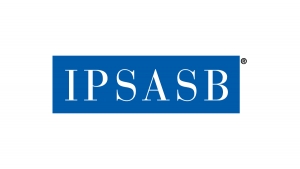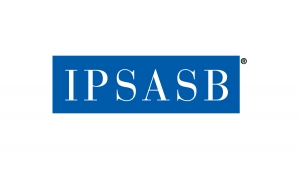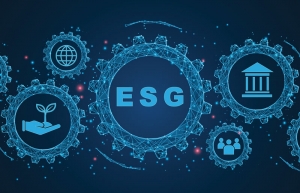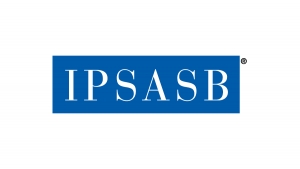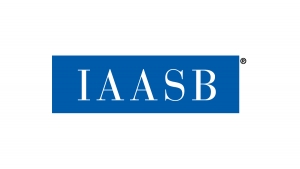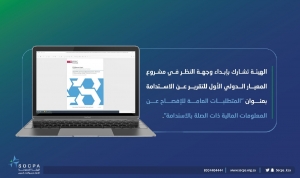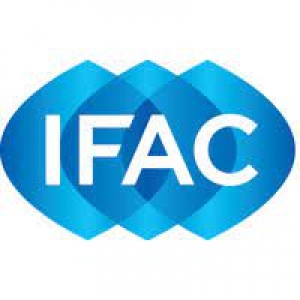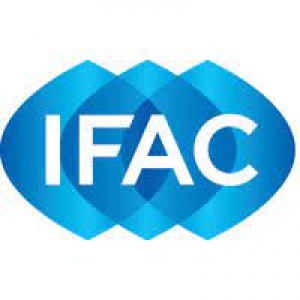عرض العناصر حسب علامة : تقارير الاستدامة
الهيئة تشارك في تنظيم اللقاء الدولي الأول للفريق الحكومي الدولي المعني بمعايير المحاسبة الدولية (ISAR) بحضور عدد من ممثلي دول الخليج والدول العربية
نظم مؤتمر الأمم المتحدة للتجارة والتنمية (UNCTAD) ممثلاُ بالفريق الحكومي الدولي المعني بمعايير المحاسبة والدولية والإبلاغ (ISAR)
مجلس المعايير المحاسبية الدولية للقطاع العام يرحب بمساهمة جمعية المحاسبين القانونيين المعتمدين في تعزيز تقارير استدامة القطاع العام
رحب مجلس المعايير المحاسبية الدولية للقطاع العام (IPSASB) بمساهمة ACCA (رابطة المحاسبين القانونيين المعتمدين) لدعم التطوير المقترح لإطار إعداد تقارير الاستدامة الخاص بالقطاع العام.
مجلس معايير المحاسبة الدولية في القطاع العام يؤكد دوره في تعزيز تقارير استدامة القطاع العام
بناءً على الدعم القوي من أصحاب المصلحة، يتخذ مجلس معايير المحاسبة الدولية للقطاع العام الخطوة التالية في النهوض بتقارير الاستدامة في القطاع العام بانتظار تأمين الموارد اللازمة لبدء تطوير التوجيه
التعريف بمستقبل محاسبة الاستدامة
معلومات إضافية
-
المحتوى بالإنجليزية
Introducing the Future of Sustainability Accounting: ESG
What is sustainability accounting? What is Environmental, Social and Governance (ESG)? And how can accountants benefit from it?
Awareness of social and environmental impacts of businesses is growing. Investors are seeking businesses that can evidence their corporate sustainability. Social awareness and fairness are dictating consumer behaviour. Meanwhile, transparency in how organisations are governed is being demanded by employees and customers alike.
All these factors have inspired the need for businesses to report on their non-financial performance. This is where accountants can help. Having a skillset in analysis, reporting and independent advice, means accountants are in the perfect position to assist businesses in their sustainable development.
But where do accountants start? In this article we explore sustainability accounting standards of ESG and how accountants can get more information.
An introduction to sustainability accounting
Sustainability accounting is the reporting of non-financial information as a result of an organisations performance. Typically this focuses on the social and environmental impacts and performance of a business.
The purpose of sustainability accounting is to help generate value in an organisation that is not necessarily directly tied to financial reporting.
Sustainability accounting can trace it's history back to the 1970s. This is when organisations began to start looking at the social and environmental impacts of their businesses. Albeit during this time period, sustainability accounting reporting was not well defined.
It took until the late 1990s to early 2000s, after wider philosophical discussions within the sector - as well as numerous social and environmental movements - for sustainability accounting to be defined.
And with this definition, came further research, literature, training programmes and the development of standards.
Sustainability accounting has a distinct benefit for accounting firms. As more and more firms begin to understand and report on their sustainable activities and impacts, they will be seeking independent advice. There is no reason this type of independent reporting can't be conducted by accountants.
Accountants already have the skills and experience to report independently. This independence can help prevent 'greenwashing' in non-financial reporting. Accountants reporting on sustainability can help businesses benefit from sustained practices. Whether that's through employee retention, customer satisfaction, better energy consumption or reduced waste.
Understanding the value of sustainability reporting
To understand the value of sustainability reporting, you have to understand how it differs from financial reporting.
At its most basic, financial reporting looks at documenting and communicating financial performance. This is through income statements, balance sheets and cashflows. The purpose is track and analyse business performance through financial incomings and outgoings.
Sustainability reporting, on the other hand, looks at the non-financial performance of a business. Specifically, its environmental impacts, social performance and governance.
But, where is the value of reporting on non-financial information for businesses?
Understanding how a business can be more sustainable has two leading benefits.
Firstly, identifying opportunities where a business can be sustainable, can have a positive impact on financial performance. For example, tracking energy usage or waste production with the aim of reducing it, can see a positive financial gain for businesses. Similarly, a business that explores its diversity performance, can introduce new ideas, viewpoints and ways of working that can have positive impacts.
Secondly, through a sustainability accounting system, a business can add more to society than just its financial impact. Combating environmental issues, having positive social impacts and operating a business with fair governance are concerns that impact everyone globally. Whilst a business accounting for these areas may not directly impact the bottom line, they do impact on whether the business itself operates in an economy that is favourable for it.
The rise in popularity of ESG
ESG is a term used to monitor three pillars of sustainability and responsibility of a business outside of financial performance.
Sustainability accounting through ESG helps businesses report on wider range of issues. This, in turn, can encourage consumer confidence through greater understand of the social responsibility impact a business has.
But the need for ESG and sustainability reporting is growing not just from a social or even political demands. Investment decisions are now being made with ESG as major considerations. Indeed, investors and investment companies are taking notice of what the sustainable development of organisations are now. And the growth of importance in ESG for making investment decisions is rapid.
Source: 2020 EY Climate Change and Sustainability Services (CCaSS) Institutional Investor Survey.
Investors are becoming more concerned about how ESG impacts business models.
There are multiple reasons for this growth in concern. Firstly, there is the global environmental issues, as well as a rise in awareness for social justice and fair governance. Meaning there is wanting from investors to work with businesses that practice corporate sustainability.
But, secondly, there is also a case of investors wanting to be ahead of the curve in relationship to potential political changes. Indeed, the EU has already implemented directives that call on companies with over 500 employees to disclose their sustainability accounting in management reports. And indeed recent proposals by the SEC in the US will also see ESG reporting become mandatory for large businesses.
Ultimately, the rise in ESG is coming from business first. With the political demand coming second. And whilst regulation is currently focused on larger businesses, there is no reason small and medium size businesses can't also start looking at their sustainability accounting.
But what are the pillars that make up ESG? What is meant by Environmental, Social and Governance? And what areas make up each of the three pillars of ESG?
Environmental Factors
The impact that a business has on the environment should be accounted for within sustainability accounting.
Typically, this can include (but not limited to) reporting on:
energy usage
wastage
use of natural resources
pollution.
It is also important to report on environmental opportunities. Where can the business lessen its impact on the environmental? Opportunities should be included in any sustainability reporting.
Social Factors
Sustainability accounting also looks at how the business maintains its corporate social responsibility. This should be treated as more than social activities it does by focusing on what policies it has and the impact of actions from those policies.
Social factors can include:
diversity
product safety
human rights in supply chains
data privacy
health and safety
investment in people.
Being clear on your Social Factors with provable metrics to support them can further give a business a clear Human Resources strategy. Furthermore, having evidence of your Social Factors can help support your recruitment drives by proving to be an employer of choice.
Governance Factors
Key to producing reliable sustainability accounting is an honest and transparent reporting of corporate governance. This makes companies more accountable for their actions and helps respond to stakeholder concerns.
Reporting on Governance Factors can include:
management structure
ownership and control
representation of employees in decision making
bonus payments and compensation
pay equality across genders.
The purpose of Governance Factors is to showcase leadership accountability. Organisations reporting higher ratings of Governance transparency see less mismanagement, fewer scandals and have better reputations. This can lead to greater investor confidence as well as a more motivated workforce.
Benefits of ESG for Accountants
Sustainability accounting requires measurement and reporting in a way that carries assurance of the truth.
Being able to report ESG information in an independent capacity can help businesses be transparent with their sustainability. And this is important. Honest, transparent reporting of good quality, information that can be trusted is the only way a business can modify its behaviour for sustainable development.
Accountants are in the unique position to be able to offer this service due their existing skillsets and reputation.
With the growth of awareness in ESG, and businesses wanting to report on their sustainability, Accountants that can offer sustainability accounting create the ability to differentiate themselves from competitors.
يتلقى مجلس المعايير المحاسبية الدولية للقطاع العام (IPSASB) تشجيعًا قويًا لمقترحات تقرير الاستدامة الخاصة به
تلقى مجلس المعايير المحاسبية الدولية للقطاع العام (IPSASB)، المطور لمعايير المحاسبة الدولية للقطاع العام، معايير المحاسبة الدولية القائمة على الاستحقاق لتستخدمها الحكومات وكيانات القطاع العام الأخرى في جميع أنحاء العالم، مشاركة قوية بشكل عام وردود فعل من أصحاب المصلحة على الصعيد العالمي بشأن المقترحات في أحدث إصدار لها.
ترحيب من IAASB و IESBA بيان دعم IOSCO لتطوير المعايير المتعلقة بضمان المعلومات المتعلقة بالاستدامة
يرحب مجلس معايير التدقيق والتأمين الدولي (IAASB) ومجلس معايير الأخلاقيات الدولية للمحاسبين (IESBA) بإعلان اليوم من المنظمة الدولية لهيئات الأوراق المالية (IOSCO) عن دعمها وتشجيعها لعمل IAASB و IESBA على تطوير المعايير المتعلقة بالتأمين.
الهيئة تشارك بإبداء وجهة النظر في مشروع المعيار الدولي الأول للتقرير عن الاستدامة بعنوان المتطلبات
نشر مجلس المعايير الدولية للاستدامة أول مشروع للمعايير الدولية للتقرير عن الاستدامة بعنوان ""المتطلبات العامة للإفصاح عن المعلومات المالية ذات الصلة بالاستدامة". وبعد التشاور مع ذوي الاهتمام أعد مجلس معايير المحاسبة في الهيئة السعودية للمراجعين والمحاسبين وجهة نظر شاملة لما ورد في مشروع المعيار.
الهيئة تشارك بإبداء وجهة النظر في مشروع المعيار الدولي الثاني للتقرير عن الاستدامة بعنوان الإفصاحات
نشر مجلس المعايير الدولية للاستدامة ثاني مشروع للمعايير الدولية للتقرير عن الاستدامة بعنوان ""الإفصاحات ذات الصلة بالمناخ". وبعد التشاور مع ذوي الاهتمام أعد مجلس معايير المحاسبة في الهيئة السعودية للمراجعين والمحاسبين وجهة نظر شاملة لما ورد في مشروع المعيار.
تلتزم IESBA بإعداد معايير الأخلاق والاستقلالية العالمية في الوقت المناسب لدعم إعداد تقارير الاستدامة وضمانها
قرر مجلس معايير الأخلاقيات الدولية للمحاسبين (IESBA) بالإجماع على اتخاذ الإجراءات في الوقت المناسب لتطوير معايير الأخلاقيات والاستقلالية الملائمة للغرض والقابلة للتطبيق عالميًا كجزء أساسي من البنية التحتية اللازمة لدعم تقارير الاستدامة الشفافة وذات الصلة والجديرة بالثقة.
معلومات إضافية
-
المحتوى بالإنجليزية
IESBA COMMITS TO READYING GLOBAL ETHICS AND INDEPENDENCE STANDARDS TIMELY IN SUPPORT OF SUSTAINABILITY REPORTING AND ASSURANCE
The International Ethics Standards Board for Accountants (IESBA) has unanimously resolved to take timely action to develop fit-for-purpose, globally applicable ethics and independence standards as a critical part of the infrastructure needed to support transparent, relevant and trustworthy sustainability reporting. This recognizes the need to respond at pace to match the speed of transformation in the corporate reporting landscape. Demand for sustainability information has risen substantially and rapidly in recent years, and such information is increasingly used to support capital allocation or other decisions by investors, customers, current or potential employees, and other stakeholders. It also recognizes the essential role ethics and independence play in the production, reporting and assurance of sustainability information.
The IESBA has tasked its recently established Sustainability Working Group to develop a strategic vision to guide the IESBA’s standard-setting actions in relation to sustainability reporting and assurance. The Working Group will prepare a project plan by December 2022 as a launchpad for commencement of standard-setting work soon after. This work will proceed in tandem with the development of IFRS Sustainability Disclosure Standards by the International Sustainability Standards Board (ISSB), and sustainability-related International Standards on Assurance Engagements (ISAEs) by the International Auditing and Assurance Standards Board (IAASB). The IESBA recognizes the importance of coordinating this work closely with the ISSB and IAASB so that coherent, mutually reinforcing building blocks of standards can be put in place around the same time to support the necessary regulatory infrastructure for sustainability reporting.
“Sustainability has risen to the top of our strategic agenda as societal expectations have unquestionably changed towards the need for companies and organizations to pursue more sustainable business goals, capital has flowed in substantial waves towards Environmental, Social and Governance (ESG)-focused investments, and concerns about market integrity have triggered regulatory mobilizations and actions,” said IESBA Chair Gabriela Figueiredo Dias. “Time is of the essence and it is critical that the ethics standards pillar of the infrastructure be strong and ready to support the sustainability information supply chain. Stakeholder expectations are high and we are determined to take the necessary actions to meet the market needs.”
The IESBA has been proactively engaged in outreach to stakeholders to exchange views and insights on the emerging issues in sustainability reporting and assurance, and is actively involved in discussions with the International Organization of Securities Commissions (IOSCO) and the IAASB on coordinated plans and actions to respond to the developments.
Pending finalization of the IESBA’s plan of work for sustainability-related ethics and independence standard-setting, IESBA Staff will issue in the near term guidance to draw the attention of professional accountants and other market participants to the fundamental principles and key provisions of the IESBA’s International Code of Ethics for Professional Accountants (including International Independence Standards) that already apply broadly to sustainability reporting and assurance.
الاتحاد الدولي للمحاسبين يواصل الدعوة إلى التقارب في الإفصاح عن الاستدامة العالمية
بصفته الصوت العالمي لمهنة المحاسبة، دعم الاتحاد الدولي للمحاسبين نظامًا عالميًا لتقديم معلومات استدامة متسقة وقابلة للمقارنة وقابلة للتأكيد.
معلومات إضافية
-
المحتوى بالإنجليزية
IFAC Continues to Advocate for Convergence in Global Sustainability Disclosure
Welcomes EFRAG’s public consultation on European Sustainability Reporting Standards (ESRS) exposure drafts
As the global voice of the accountancy profession, IFAC has supported a global system for delivering consistent, comparable and assurable sustainability information. Such disclosure must become a core component of the corporate reporting ecosystem that helps stakeholders assess objectives and progress towards addressing the climate crisis and other important environmental, social, and governance matters. European Sustainability Reporting Standards can play an important part in aligning global and jurisdictional-specific goals.
IFAC supports the view that sustainability disclosure requirements should be developed to capture and measure what really matters and to facilitate adoption and implementation in an internationally compatible manner. Alignment between global and jurisdiction-specific requirements, to the extent possible, is key for companies who operate across national borders, who compete for capital globally, and who are working towards a more sustainable future.
IFAC CEO Kevin Dancey said “Collectively, we have an historic opportunity to embrace equivalency and interoperability in sustainability initiatives around the world, to leverage the work of existing high-quality sustainability frameworks, and to avoid costly regulatory fragmentation and complexity. Toward this end, IFAC strongly supports the ISSB’s recently announced working group that will establish dialogue for enhanced compatibility between the ISSB’s recent exposure drafts and ongoing jurisdictional initiatives like that of the European Union.”
The European Commission’s ambitious Corporate Sustainability Reporting Directive seeks to put sustainability-related reporting on the same footing as traditional financial reporting—addressing what sustainability information must be reported and requiring its assurance, among other important elements that can enhance corporate reporting. We hope this important work ultimately contributes to—and amplifies the impact of—an emerging global sustainability disclosure system.


